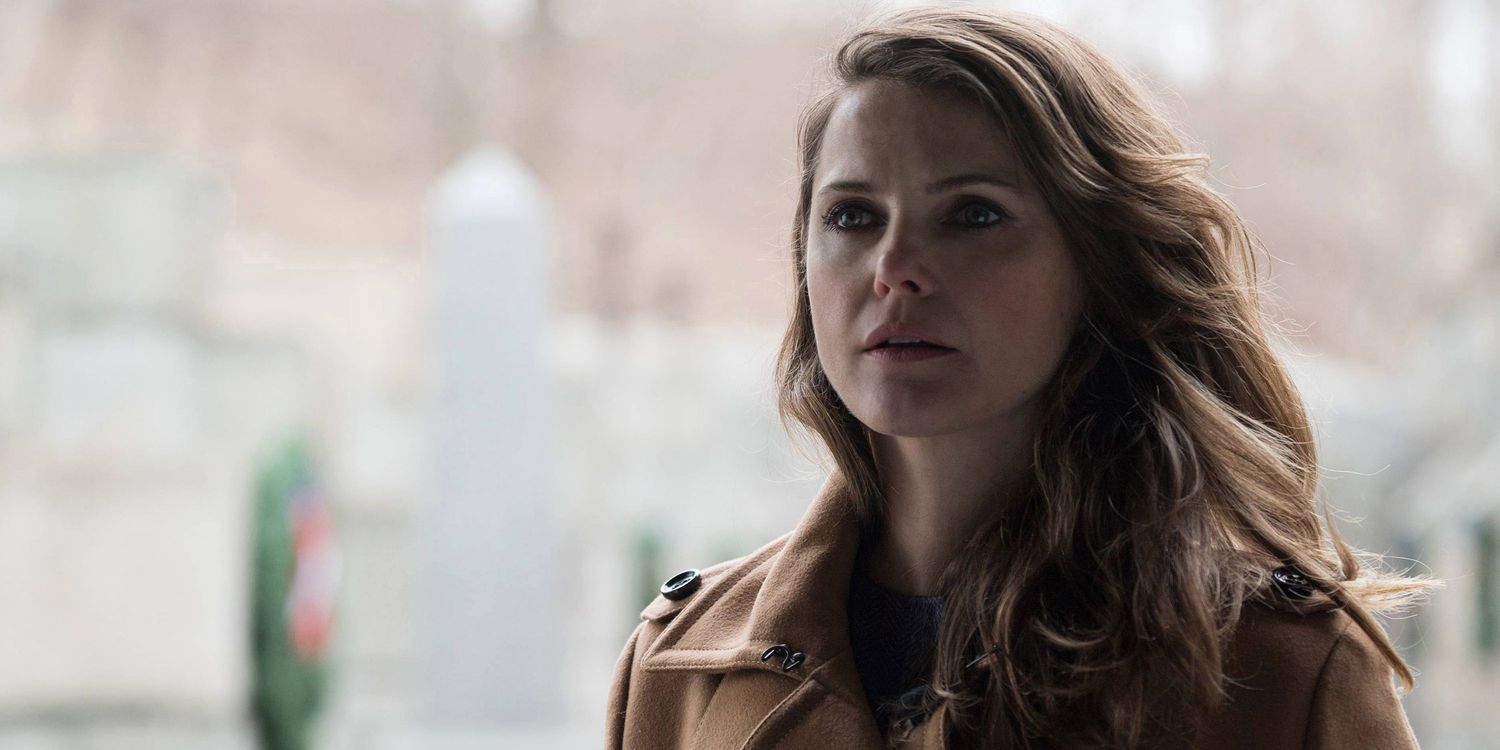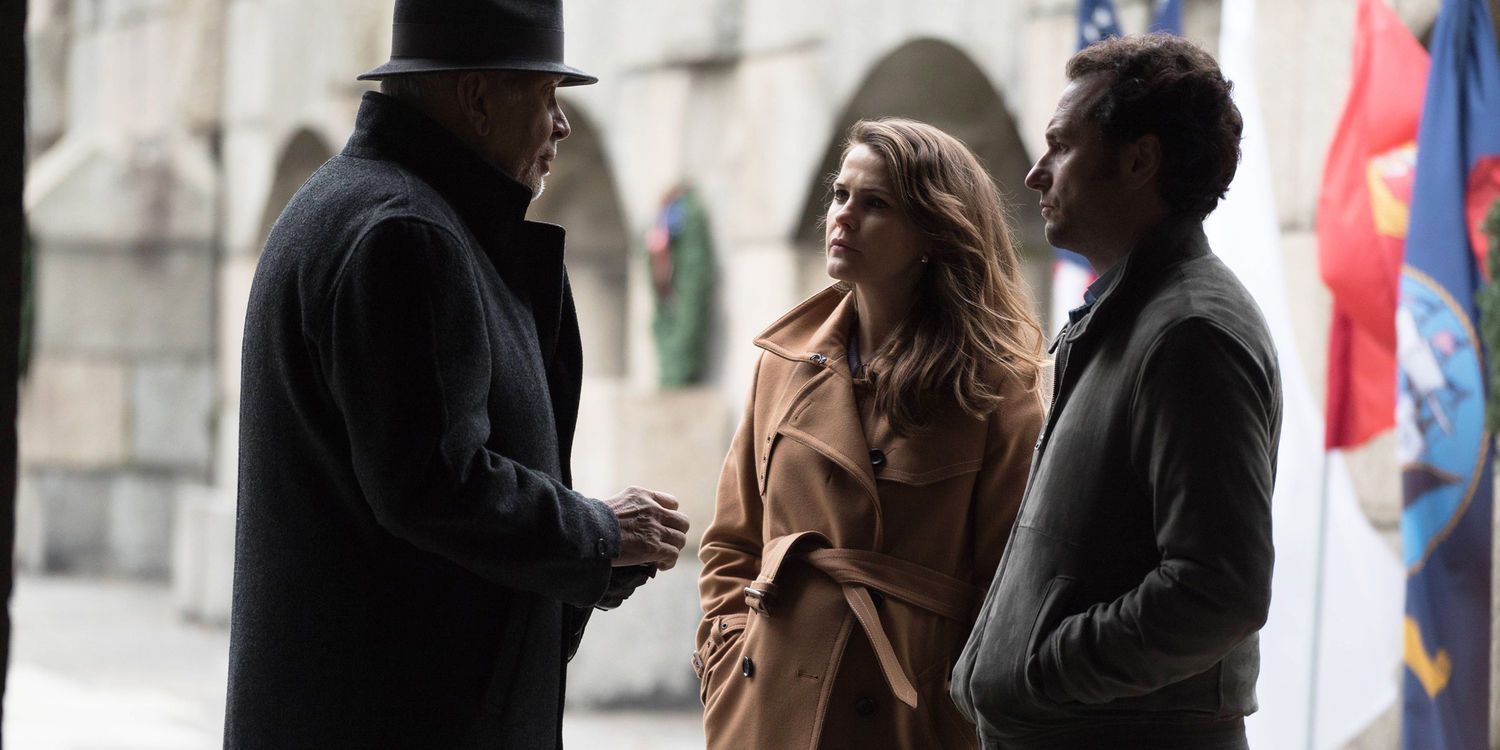[This is a review of the season 4 finale of The Americans. There will be SPOILERS.]
-
To look at what The Americans has done with its narrative over the course of four seasons is to see a remarkable case of progression in storytelling. The series has gone from being a spy thriller to the most thrilling and engaging domestic drama on television today. There is nothing else that comes close to reaching the emotional highs and lows The Americans does with startling frequency. Nothing else has such competence with regard to how the series handles tension, let alone doles it out consistently without desensitizing the audience to its potent effects. Case in point: season 4 was another high-wire act of international intrigue and family drama that began a slow, methodical process of pushing away from the espionage angle of the series' original conceit to better embrace a deeper exploration of the lives within the four walls of the Jennings' household.
The transition is mirrored in the season narrative as well, as though the progression of the series has become the text of Elizabeth and Philip's lives as spies for the Soviet Directorate S program. But co-showrunners Joseph Weisberg and Joel Fields have taken this distinction a step further, almost making a meta-commentary on the future of The Americans itself, which it was announced would receive a fifth and sixth season, bringing the series to its conclusion. "The job wasn't meant to be forever," Gabriel tells Elizabeth and Philip near the end of 'Persona Non Grata.' It's easy to see Frank Langella as a stand-in for Weisberg and Fields, telling their operatives (and the audience) that everything eventually comes to an end – the subtext being: the future is only partially out of your hands.
The events of the season's final episode bring a whiff of nostalgia and relief – inasmuch as it pertains to Elizabeth and Philip, anyway – to the proceedings. That they mirror the announcement of the show's future on FX and that one of TV's best dramas will be able to end on its own terms may be coincidental but it adds another layer to an encroaching sense of finality to the story of The Americans. 'Persona Non Grata,' then, takes the awareness of inevitability and puts the sort of spin on it that the show does so well: The characters are presented an option that is at once impossible and impossible to resist. That they are compelled by personal desire as opposed to the desires of the Motherland is perhaps the vital component in making the season's end as captivating and emotionally complicated as it is.
From the first moment on, the clock is ticking. This is nothing new to the series, and yet there's no comfort drawn from its familiarity. The Americans excels in making the television equivalent of defusing an explosive device; the characters are often just one wrong move from blowing up their entire lives. And yet, as the hour opens on season-long guest star and frontrunner for the title of Persona Non Grata, William Crandall (Dylan Baker), the life being blown up is done so willingly, as even the man to which that life belongs considers it forfeit at this point.
To see Stan and Agent Aderholt descend upon William, following Oleg's admission of an asset inside the U.S.'s non-existent (but totally existent) biological weapons program, the concern never lingers on William for long, shifting instead to Philip and Elizabeth. William's end via his own hand (literally) is his implicit knowledge and acceptance of this; he is cognizant of the role he plays in the Cold War and in The Americans: a cog in the Great Red Machine and a bit player in the story of the Jennings' life. The realization is made more significant by William's deathbed admission that his life was one of loneliness and isolation; his importance tied to the ever-open hand of a country to which he no longer belonged but remained reflexively devoted to. "They always wanted more," William tells Stan and Aderholt, an assertion likely felt by so many in any number of professions lacking the high stakes of international espionage. No matter what you accomplish, how much blood, sweat, and tears you put into your work, it's never enough; the job – the machine – still needs to be serviced, it still needs to be fed. William's understanding of his role – that he isn't the hero of his own story or that his story outside the procurement of dangerous biological samples never even got off the ground – makes the taking of his own life to protect his secrets and keep from naming Philip and Elizabeth, in exchange for some enticing offer from the US government, a painful admission that he was a casualty of the Cold War a long time ago. For this leak to come along with the surge of essential fluids escaping his body ranks high among the most painful and gripping moments of the series.
William's quarantine, then, and the virus destroying his body, making him as unwelcome a presence in the physical space of others as he felt he was in his unsuccessful personal life, stands in stark contrast to the relative intimacy on display in some of the other threads. After a season punctuated again and again by separation and loss – Nina's execution in a Russian prison, Martha's flight from the country, Agent Gaad's retirement and subsequent death while on holiday, Elizabeth's deliberate destruction of a fake but nonetheless meaningful friendship, etc. – small moments of tenderness and physical connection stand out more than Philip in his Geraldo Rivera-inspired disguise.
After what appears to be mom getting the cold shoulder from her daughter, tensions are eased when Elizabeth scoots into bed with Paige. All season long The Americans has been evaluating the disconnect between the religious pacifist Paige and her parents, only to show a significant turning point in her request to learn how to defend herself like her mother did. It's a contradiction that at once calls to mind the night Elizabeth first drew blood in her daughter's presence, piercing Paige's ears. And it is the first of many times the finale explores the notion of physical intimacy. That intimacy is later underlined with Paige's dalliance with Matthew while poor Henry is left to watch the Super Bowl alone. The pursuit of personal connection – whether for the first time, like Philip's Russian-born son, or for the umpteenth time, like Henry's acknowledgment that he had to watch The Big Game solo – permeates the finale and adds to the weight of Philip and Elizabeth's choice to head back to Mother Russia or wait and see whether or not William gave them up to the FBI.
Stan returns home from presumably seeing William surrender to the virus only to find Paige and Matthew canoodling on his couch. His response is so atypical from how audiences have been taught television parents are supposed to act when teenagers engage in that sort of physical intimacy – Stan is neither embarrassed nor disapproving; he seems the opposite, really – it almost would have been easier on Philip if his neighbor had come home with five FBI cars in tow. The suddenness with which Philip moves to terminate his daughter's interest in Matthew is a callback and a contradiction to what he told her in 'A Roy Rogers in Franconia': "We're not lying to you. But don't do anything because of us." As it turns out, Paige doesn't have much of a choice in what she does.
'Persona Non Grata' is another high-water mark for The Americans, a series that just doesn't do bad seasons. As the series shifts further and further away from its espionage roots to dig deeper into the personal lives of its spies, it finds greater truths in the humanity on both sides of the Iron Curtain (how could you not feel something for Arkady, much less Oleg and Tatiana as they said – or didn't say – their goodbyes?). In the end this is another mesmerizing conclusion to an outstanding season.
-
The Americans will return for season 5 in 2017 on FX.



